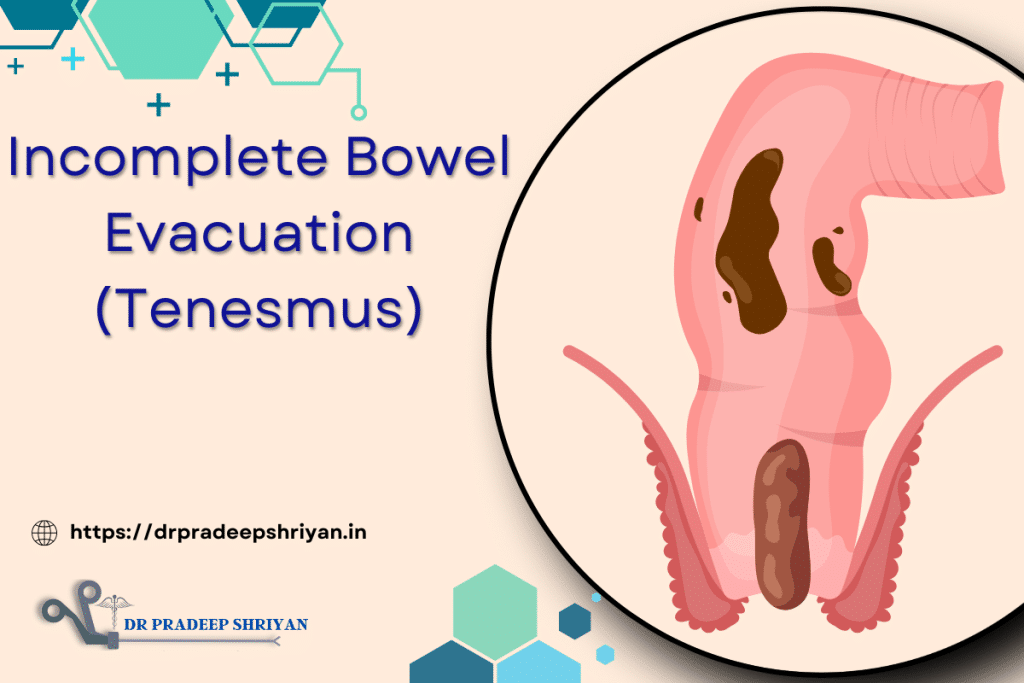Proctitis Treatment in Mumbai. Proctitis is an inflammation of the rectum, which is the last section of the large intestine before the anus.
Tenesmus is the persistent sensation of incomplete bowel evacuation, often with cramping or rectal discomfort. Causes include inflammatory bowel diseases, rectal conditions, pelvic floor dysfunction, and constipation. Diagnosis involves physical exams, colonoscopy, and imaging tests. Treatment includes medications, dietary changes, pelvic floor therapy, or surgery in severe cases. Proper medical care ensures effective management and recovery as explained by a senior Proctologist and Gastrointestinal Surgeon in Mumbai
February 6, 2025
Tenesmus is a term used to describe a persistent and often painful sensation of incomplete bowel evacuation or the feeling that you need to pass stools even after having a bowel movement. This sensation can be accompanied by straining, cramping, or discomfort in the rectum or lower abdomen.

The primary symptom of tenesmus is a persistent and often painful sensation of incomplete bowel evacuation, even after passing stools. Other symptoms may include:
If you experience any of these symptoms, it’s crucial to seek medical attention, as tenesmus can be a sign of an underlying condition that requires proper diagnosis and treatment.

Diagnostic Procedures:
To determine the cause of tenesmus and develop an appropriate treatment plan, a Gastrointestinal Surgeon may recommend one or more of the following diagnostic procedures:
Procedure | Purpose |
Physical Examination | Evaluate the rectum and anus for any abnormalities |
Digital Rectal Examination | Manually examine the rectum for masses or other issues |
Colonoscopy or Sigmoidoscopy | Visually inspect the rectum and colon using a lighted tube |
Imaging Tests (CT, MRI) | Obtain detailed images of the rectum and surrounding areas |
Anorectal Manometry | Assess the function of the rectum and anal sphincter muscles |
The recovery period for tenesmus can vary depending on the underlying cause and the treatment approach. With appropriate medical management, many cases of tenesmus can be resolved or significantly improved within a few weeks or months. However, if surgery is required, the recovery period may be longer.
If surgery is recommended for your condition causing tenesmus, Gastrointestinal Surgeon will provide you with specific instructions for pre-operative preparation and post-operative care to ensure a smooth recovery. These may include:
Pre-operative Care:
Post-operative Care:
Gastrointestinal Surgeon will guide you through the entire process, addressing any concerns or questions you may have.
Tenesmus itself is not a life-threatening condition, but it can be a symptom of an underlying issue that may require medical attention. Persistent or severe tenesmus should be evaluated by a healthcare professional.
While stress and anxiety can contribute to digestive issues, they are not typically the primary cause of Tenesmus. However, managing stress and anxiety can help alleviate some of the discomfort associated with Tenesmus.
No, Tenesmus is not a contagious condition. It is a symptom of an underlying issue, which may or may not be contagious depending on the cause.
Seeking prompt health advice for Tenesmus (Incomplete Bowel Movement treatment in Mumbai) is not just for symptom relief but also for screening associated problems.
If you are near Mumbai, you can Contact the Senior Gastrointestinal Surgeon in Mumbai – Dr Pradeep Shriyan
Don’t ignore the troublesome symptoms of Proctitis, Peptic Ulcer, IBS or related issues. Remember, early diagnosis and treatment of Peptic Ulcers, Stomach pain, etc are crucial for preventing potential complications and ensuring a successful outcome.

Contact Us
Proctitis Treatment in Mumbai. Proctitis is an inflammation of the rectum, which is the last section of the large intestine before the anus.
Peptic Ulcer Treatment in Mumbai
IBS (Irritable Bowel Syndrome) is a chronic disorder that affects the large intestine (colon). It is characterized by abdominal pain, bloating, and changes in bowel habits, etc.
Constipation, piles (haemorrhoids), anal fissures, and other colorectal conditions can be uncomfortable and even painful. While medical treatment is often necessary, making appropriate dietary changes can greatly alleviate symptoms explained by Piles Doctor in Mumbai
Developed by PRAZONE Web Solutions
Copyright © 2024 All rights reserved by
Dr Pradeep Shriyan